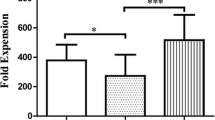Abstract
We studied the effect of protein-bound polysaccharide PSK on the activation of the human natural killer cell line NKL. We observed an increased natural killer cytotoxic activity against different tumor cells (K562, Daudi, and U937) when a standard 2- to 3-h51chromium release assay was performed. The results parallel those obtained after treatment of the NKL cell line with interleukin-2. The highest cytotoxic activity was reached at a concentration of 100 µg/ml of PSK. This natural killer activation was inhibited when the PSK dose was 1,000 µg/ml. None of the cell surface markers that were analyzed by fluorescence-activated cell sorting showed variations after PSK or interleukin-2 treatment of NKL cells. These markers included CD2, CD11b, CD11c, CD18, CD16, CD54, CD56, CD98, CD25, CD122, HLA class I, HLA class II, CD94, ILT2, p58.1, p70, and NKp46. One of these markers (NKp46) is a major triggering receptor reported to be involved in the natural cytotoxicity of fresh or cultured human natural killer cells. In our study, another triggering receptor must be implicated in PSK-induced natural killer lysis. Our data suggest that PSK is an important biological response modifier of natural killer cells in vitro and may prove to be useful for the study of human natural killer cell biology.
Similar content being viewed by others
References
Tsukagoshi S, Hashimoto Y, Fujii G, Kobayashi H, Nomoto K, Orita K. Krestin (PSK). Cancer Treat Rev 1984;11:131.
Ogoshi K, Satou H, Isono K, Mitomi T, Endoch M, Sugita M. Possible predictive markers of immunotherapy in esophageal cancer: retrospective analysis of a randomized study. Cancer Invest 1995;13:363.
Nakazato H, Koike A, Saji S, Ogawa N, Sakamoto J. Efficacy of immunochemotherapy as adjuvant treatment after curative resection of gastric cancer. Lancet 1994; 343:1122.
Yefenof E, Einat E, Klein E. Potentiation of T cell immunity against radiation-leukemia-virus-induced lymphoma by polysaccharide K. Cancer Immunol Immunother 1991;34:133.
Nio Y, Shiraishi T, Tsubono M, Morimoto H, Tseng CC, Imai S, Tobe T. In vitro immunomodulating effect of protein-bound polysaccharide, PSK on peripheral blood, regional nodes, and spleen lymphocytes in patients with gastric cancer. Cancer Immunol Immunother 1991;32:335.
Kobayashi H, Matsunaga K, Fujii M. PSK as a chemopreventive agent. Cancer Epidemiol Biomarkers Prev 1993;2:271.
Kariya Y, Inoue N, Kihara T, Okamoto N, Sugie K, Mori T, Uchida A. Activation of human natural killer cells by the protein bound polysaccharide PSK independently of interferon and interleukin 2. Immunol Lett 1992;31:241.
Algarra I, Collado A, Garrido F. Protein bound polysaccharide PSK abrogates more efficiently experimental metastases derived from H-2 negative than from H-2 positive fibrosarcoma tumor clones. J Exp Clin Cancer Res 1997;16:373.
Algarra I, Garcia A, Collado A, Garrido F. Differential effect of protein-bound polysaccharide (PSK) on survival of experimental murine tumors. J Exp Clin Cancer Res 1999;18,1:39.
Robertson MJ, Cochran KJ, Cameron C, Le JM, Tantravahi R, Ritz J. Characterization of a cell line, NKL, derived from an aggressive human natural killer cell leukemia. Exp Hematol 1996;24:406.
Samaradis J, Colonna M. Cloning of novel immunoglobulin superfamily receptors expressed on myeloid and lymphoid cells: structural evidence for new stimulatory and inhibitory pathways. Eur J Immunol 1996;27:660.
Colonna M, Navarro F, Bellon T, Llano M, Garcia P, Samarandis J, Angman L, Cella M, Lopez-Botet M. A common inhibitory receptor for major histocompatibility complex class I on human lymphoid and myelomonocytic cells. J Exp Med 1997;186:1809.
Robertson MJ, Cochran KJ, Ritz J. Characterization of surface antigens expressed by normal and neoplastic human natural killer cells. In: Schlossman SF, Boumsell L, Gilks W, Harlan JM, Kishimoto T, Morimoto C, Ritz J, Shaw S, Silverstein RL, Springer TA, Tedder TF, Todd RF, eds. Leukocyte typing V. White differentiation antigens. Oxford: Oxford Press 1995:1374.
Nakarai T, Robertson MJ, Streuli M, Wu Z, Ciardelli TL, Smith KA, Ritz J. Interleukin 2 receptor γ chain expression on resting and activated lymphoid cells. J Exp Med 1994;180:241.
Carretero M, Cantoni C, Bellon T, Bottino C, Biassoni R, Rodrigues A, Perez-Villar JJ, Moretta L, Moretta A, Lopez-Botet M. The CD94 and NKG2-A C type lectins covalently assemble to form a natural killer cell inhibitory receptor for HLA class I molecules. Eur J Immunol 1997;27:563.
Perez-Villar JJ, Melero I, Navarro F, Carretero M, Bellon T, Llano M, Colonna M, Geraghty DE, Lopet-Botet M. The CD94/NKG2-A inhibitory receptor complex is involved in natural killer cell-mediated recognition of cells expressing HLA-G1. J Immunol 1997;158:5736.
Pessino A, Sivore S, Bottino C, Malaspina A, Morelli L, Moretta L, Biassoni R, Moretta A. Molecular cloning of NKp46: a novel member of the immunoglobulin superfamily involved in triggering of natural cytotoxicity. J Exp Med 1998;188:953.
Sivori S, Pende D, Bottino C, Marcenaro E, Pessino A, Biassoni R, Moretta L, Moretta A. NKp46 is the major triggering receptor involved in the natural cytotoxicity of fresh or cultured human NK cells. Correlation between surface density of NKp46 and natural cytotoxicity against autologous, allogeneic or xenogeneic target cells. Eur J Immunol 1999;29:1656.
Cantoni C, Bottino C, Vitale M, Pessiono A, Augugliaro R, Malaspina A, Parolini S, Moretta L, Moretta A, Biassoni R. NKp44, a triggering receptor involved in tumor cell lysis by activated human natural killer cells, is a novel member of the immunoglobulin superfamily. J Exp Med 1999;189:787.
Bauer S, Groh V, Wu J, Steinle A, Phillips JH, Lanier LL, Spies T. Activation of NK cells and T cells by NKG2D, a receptor for stress-inducible MICA. Science 1999;285:727.
Author information
Authors and Affiliations
Rights and permissions
About this article
Cite this article
Pedrinaci, S., Garrido, F. & Algarra, I. Protein-bound polysaccharide (PSK) induces cytotoxic activity in the NKL human natural killer cell line. Int J Clin Lab Res 29, 135–140 (1999). https://doi.org/10.1007/s005990050079
Received:
Accepted:
Issue Date:
DOI: https://doi.org/10.1007/s005990050079



